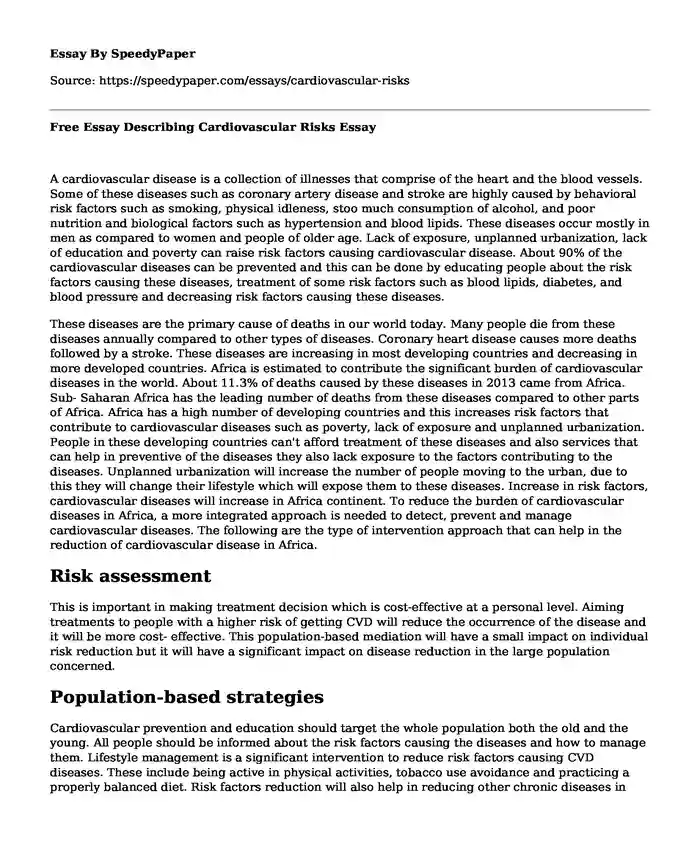A cardiovascular disease is a collection of illnesses that comprise of the heart and the blood vessels. Some of these diseases such as coronary artery disease and stroke are highly caused by behavioral risk factors such as smoking, physical idleness, stoo much consumption of alcohol, and poor nutrition and biological factors such as hypertension and blood lipids. These diseases occur mostly in men as compared to women and people of older age. Lack of exposure, unplanned urbanization, lack of education and poverty can raise risk factors causing cardiovascular disease. About 90% of the cardiovascular diseases can be prevented and this can be done by educating people about the risk factors causing these diseases, treatment of some risk factors such as blood lipids, diabetes, and blood pressure and decreasing risk factors causing these diseases.
These diseases are the primary cause of deaths in our world today. Many people die from these diseases annually compared to other types of diseases. Coronary heart disease causes more deaths followed by a stroke. These diseases are increasing in most developing countries and decreasing in more developed countries. Africa is estimated to contribute the significant burden of cardiovascular diseases in the world. About 11.3% of deaths caused by these diseases in 2013 came from Africa. Sub- Saharan Africa has the leading number of deaths from these diseases compared to other parts of Africa. Africa has a high number of developing countries and this increases risk factors that contribute to cardiovascular diseases such as poverty, lack of exposure and unplanned urbanization. People in these developing countries can't afford treatment of these diseases and also services that can help in preventive of the diseases they also lack exposure to the factors contributing to the diseases. Unplanned urbanization will increase the number of people moving to the urban, due to this they will change their lifestyle which will expose them to these diseases. Increase in risk factors, cardiovascular diseases will increase in Africa continent. To reduce the burden of cardiovascular diseases in Africa, a more integrated approach is needed to detect, prevent and manage cardiovascular diseases. The following are the type of intervention approach that can help in the reduction of cardiovascular disease in Africa.
Risk assessment
This is important in making treatment decision which is cost-effective at a personal level. Aiming treatments to people with a higher risk of getting CVD will reduce the occurrence of the disease and it will be more cost- effective. This population-based mediation will have a small impact on individual risk reduction but it will have a significant impact on disease reduction in the large population concerned.
Population-based strategies
Cardiovascular prevention and education should target the whole population both the old and the young. All people should be informed about the risk factors causing the diseases and how to manage them. Lifestyle management is a significant intervention to reduce risk factors causing CVD diseases. These include being active in physical activities, tobacco use avoidance and practicing a properly balanced diet. Risk factors reduction will also help in reducing other chronic diseases in Africa.
Primary prevention
Many people have no CRD diseases but they are exposed to risk factors causing the disease. Prevention strategy is put in place to prevent healthy people from getting the disease. This approach targets the main risk factors such as obesity, physical inactivity, hypertension, tobacco consumption, and cholesterol abnormalities. These risk factors control are either focused on people who risk factors are already high or too whole population to prevent risk factors present among the individuals. The advanced individual approach which identifies multifactorial involvement of risk factors causing CVD and offers screen services to people with a high risk of the disease based on the numerous risk factors is used. This approach has been found to be cost-effective and more effective to use in Africa. Using multidrug regimen for treatment of an individual with a high risk of CVD will be cost effective. Treatment with statin, aspirin and two hypertensive agents can reduce deaths caused by cardiovascular up to 50% and extend life up to two years. It has also proved to be cost effective. As it will help reduction and prevention of the disease in the region.
Secondary prevention
Its aims in the identification of disease within the person before the appearance of symptoms and impact reduction on the patient's life. In case an individual has been diagnosed with risk factors causing CVD, lifestyle change is the first interventions which have a low impact on the patient these include salt reduction, weight reduction, and dietary restrictions. Medical intervention is the second intervention which is more affordable compared to tertiary interventions. Use of statin therapy to maintain body lipids and use of beta blockers to treat hypertension are the medical intervention which is more cost-effective.
In conclusion, cardiovascular disease causes a high number of deaths compared to other diseases. People who have survived the disease need treatments which are long-term and may be expensive to people in developing countries in Africa. The social and economic cost of these diseases is more in Africa because it is still struggling with other diseases related to poverty such as malnutrition. Interventions used will help reduce the burden of the disease in Africa.
Cite this page
Free Essay Describing Cardiovascular Risks. (2022, Oct 12). Retrieved from https://speedypaper.com/essays/cardiovascular-risks
Request Removal
If you are the original author of this essay and no longer wish to have it published on the SpeedyPaper website, please click below to request its removal:
- Free Essay: Rock and/or Folk Music and War, Politics or Workers' Rights
- Career Essay Sample on a Digital Video Editor Job
- Relationship Between Self-efficacy and Symptoms of Anxiety and Depression
- Essay Example on Overpopulation in Mexico City
- Paper Example on Interpersonal and Non Verbal Communication
- Essay Sample on Ethical Dilemmas Encountered in the Nursing Practice
- Essay Example: Background of Why the Study Was Done
Popular categories





